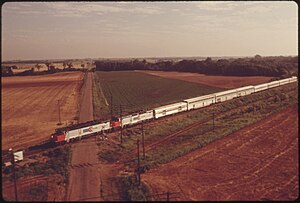Lone Star (Amtrak train)
 A southbound Lone Star between Guthrie and Norman, Oklahoma, in 1974. | |||||||||||||||||||||||||||||||||||||||||||||||||||||||||||||||||||||||||||||||||||||||||||||||||||||||||||||||||||||||||||||||||||||||||||||||||||||||||||||||||||||||||||||||||||||||||||||||||||||||||||||||||||||||||||||||||||||||||||||||||||||||||||||||||||||||||||||||||||||||||||||||||||||||||||||||||||||||||||||||||||||||||||||||||||||||||||||||||
| Overview | |||||||||||||||||||||||||||||||||||||||||||||||||||||||||||||||||||||||||||||||||||||||||||||||||||||||||||||||||||||||||||||||||||||||||||||||||||||||||||||||||||||||||||||||||||||||||||||||||||||||||||||||||||||||||||||||||||||||||||||||||||||||||||||||||||||||||||||||||||||||||||||||||||||||||||||||||||||||||||||||||||||||||||||||||||||||||||||||||
|---|---|---|---|---|---|---|---|---|---|---|---|---|---|---|---|---|---|---|---|---|---|---|---|---|---|---|---|---|---|---|---|---|---|---|---|---|---|---|---|---|---|---|---|---|---|---|---|---|---|---|---|---|---|---|---|---|---|---|---|---|---|---|---|---|---|---|---|---|---|---|---|---|---|---|---|---|---|---|---|---|---|---|---|---|---|---|---|---|---|---|---|---|---|---|---|---|---|---|---|---|---|---|---|---|---|---|---|---|---|---|---|---|---|---|---|---|---|---|---|---|---|---|---|---|---|---|---|---|---|---|---|---|---|---|---|---|---|---|---|---|---|---|---|---|---|---|---|---|---|---|---|---|---|---|---|---|---|---|---|---|---|---|---|---|---|---|---|---|---|---|---|---|---|---|---|---|---|---|---|---|---|---|---|---|---|---|---|---|---|---|---|---|---|---|---|---|---|---|---|---|---|---|---|---|---|---|---|---|---|---|---|---|---|---|---|---|---|---|---|---|---|---|---|---|---|---|---|---|---|---|---|---|---|---|---|---|---|---|---|---|---|---|---|---|---|---|---|---|---|---|---|---|---|---|---|---|---|---|---|---|---|---|---|---|---|---|---|---|---|---|---|---|---|---|---|---|---|---|---|---|---|---|---|---|---|---|---|---|---|---|---|---|---|---|---|---|---|---|---|---|---|---|---|---|---|---|---|---|---|---|---|---|---|---|---|---|---|---|---|---|---|---|---|---|---|---|---|---|---|---|---|---|---|---|---|---|---|---|---|---|---|---|---|---|---|---|---|---|---|---|---|---|---|
| Service type | Inter-city rail | ||||||||||||||||||||||||||||||||||||||||||||||||||||||||||||||||||||||||||||||||||||||||||||||||||||||||||||||||||||||||||||||||||||||||||||||||||||||||||||||||||||||||||||||||||||||||||||||||||||||||||||||||||||||||||||||||||||||||||||||||||||||||||||||||||||||||||||||||||||||||||||||||||||||||||||||||||||||||||||||||||||||||||||||||||||||||||||||||
| Predecessor | Texas Chief | ||||||||||||||||||||||||||||||||||||||||||||||||||||||||||||||||||||||||||||||||||||||||||||||||||||||||||||||||||||||||||||||||||||||||||||||||||||||||||||||||||||||||||||||||||||||||||||||||||||||||||||||||||||||||||||||||||||||||||||||||||||||||||||||||||||||||||||||||||||||||||||||||||||||||||||||||||||||||||||||||||||||||||||||||||||||||||||||||
| First service | May 19, 1974 | ||||||||||||||||||||||||||||||||||||||||||||||||||||||||||||||||||||||||||||||||||||||||||||||||||||||||||||||||||||||||||||||||||||||||||||||||||||||||||||||||||||||||||||||||||||||||||||||||||||||||||||||||||||||||||||||||||||||||||||||||||||||||||||||||||||||||||||||||||||||||||||||||||||||||||||||||||||||||||||||||||||||||||||||||||||||||||||||||
| Last service | October 8, 1979 | ||||||||||||||||||||||||||||||||||||||||||||||||||||||||||||||||||||||||||||||||||||||||||||||||||||||||||||||||||||||||||||||||||||||||||||||||||||||||||||||||||||||||||||||||||||||||||||||||||||||||||||||||||||||||||||||||||||||||||||||||||||||||||||||||||||||||||||||||||||||||||||||||||||||||||||||||||||||||||||||||||||||||||||||||||||||||||||||||
| Former operator(s) | Amtrak | ||||||||||||||||||||||||||||||||||||||||||||||||||||||||||||||||||||||||||||||||||||||||||||||||||||||||||||||||||||||||||||||||||||||||||||||||||||||||||||||||||||||||||||||||||||||||||||||||||||||||||||||||||||||||||||||||||||||||||||||||||||||||||||||||||||||||||||||||||||||||||||||||||||||||||||||||||||||||||||||||||||||||||||||||||||||||||||||||
| Route | |||||||||||||||||||||||||||||||||||||||||||||||||||||||||||||||||||||||||||||||||||||||||||||||||||||||||||||||||||||||||||||||||||||||||||||||||||||||||||||||||||||||||||||||||||||||||||||||||||||||||||||||||||||||||||||||||||||||||||||||||||||||||||||||||||||||||||||||||||||||||||||||||||||||||||||||||||||||||||||||||||||||||||||||||||||||||||||||||
| Termini | Chicago, Illinois Houston, Texas Dallas, Texas | ||||||||||||||||||||||||||||||||||||||||||||||||||||||||||||||||||||||||||||||||||||||||||||||||||||||||||||||||||||||||||||||||||||||||||||||||||||||||||||||||||||||||||||||||||||||||||||||||||||||||||||||||||||||||||||||||||||||||||||||||||||||||||||||||||||||||||||||||||||||||||||||||||||||||||||||||||||||||||||||||||||||||||||||||||||||||||||||||
| Distance travelled | 1,368 mi (2,201.58 km) | ||||||||||||||||||||||||||||||||||||||||||||||||||||||||||||||||||||||||||||||||||||||||||||||||||||||||||||||||||||||||||||||||||||||||||||||||||||||||||||||||||||||||||||||||||||||||||||||||||||||||||||||||||||||||||||||||||||||||||||||||||||||||||||||||||||||||||||||||||||||||||||||||||||||||||||||||||||||||||||||||||||||||||||||||||||||||||||||||
| Service frequency | Daily | ||||||||||||||||||||||||||||||||||||||||||||||||||||||||||||||||||||||||||||||||||||||||||||||||||||||||||||||||||||||||||||||||||||||||||||||||||||||||||||||||||||||||||||||||||||||||||||||||||||||||||||||||||||||||||||||||||||||||||||||||||||||||||||||||||||||||||||||||||||||||||||||||||||||||||||||||||||||||||||||||||||||||||||||||||||||||||||||||
| Train number(s) | 15,16 | ||||||||||||||||||||||||||||||||||||||||||||||||||||||||||||||||||||||||||||||||||||||||||||||||||||||||||||||||||||||||||||||||||||||||||||||||||||||||||||||||||||||||||||||||||||||||||||||||||||||||||||||||||||||||||||||||||||||||||||||||||||||||||||||||||||||||||||||||||||||||||||||||||||||||||||||||||||||||||||||||||||||||||||||||||||||||||||||||
| Technical | |||||||||||||||||||||||||||||||||||||||||||||||||||||||||||||||||||||||||||||||||||||||||||||||||||||||||||||||||||||||||||||||||||||||||||||||||||||||||||||||||||||||||||||||||||||||||||||||||||||||||||||||||||||||||||||||||||||||||||||||||||||||||||||||||||||||||||||||||||||||||||||||||||||||||||||||||||||||||||||||||||||||||||||||||||||||||||||||||
| Track gauge | 1,435 mm (4 ft 8+1⁄2 in) | ||||||||||||||||||||||||||||||||||||||||||||||||||||||||||||||||||||||||||||||||||||||||||||||||||||||||||||||||||||||||||||||||||||||||||||||||||||||||||||||||||||||||||||||||||||||||||||||||||||||||||||||||||||||||||||||||||||||||||||||||||||||||||||||||||||||||||||||||||||||||||||||||||||||||||||||||||||||||||||||||||||||||||||||||||||||||||||||||
| Track owner(s) | ATSF | ||||||||||||||||||||||||||||||||||||||||||||||||||||||||||||||||||||||||||||||||||||||||||||||||||||||||||||||||||||||||||||||||||||||||||||||||||||||||||||||||||||||||||||||||||||||||||||||||||||||||||||||||||||||||||||||||||||||||||||||||||||||||||||||||||||||||||||||||||||||||||||||||||||||||||||||||||||||||||||||||||||||||||||||||||||||||||||||||
| |||||||||||||||||||||||||||||||||||||||||||||||||||||||||||||||||||||||||||||||||||||||||||||||||||||||||||||||||||||||||||||||||||||||||||||||||||||||||||||||||||||||||||||||||||||||||||||||||||||||||||||||||||||||||||||||||||||||||||||||||||||||||||||||||||||||||||||||||||||||||||||||||||||||||||||||||||||||||||||||||||||||||||||||||||||||||||||||||
The Lone Star was an Amtrak passenger train serving Chicago, Kansas City, Oklahoma City, Fort Worth, Houston and intermediate points. The train was renamed from the Texas Chief, which the Atchison, Topeka and Santa Fe Railway had introduced in 1948. Amtrak discontinued the Lone Star in 1979.
History
The Santa Fe introduced the Texas Chief between Chicago, Illinois and Galveston, Texas on April 3, 1948.[1] The service survived, with adjustments, until the coming of Amtrak in 1971. Amtrak renamed the train the Lone Star on May 19, 1974, after the Santa Fe determined that Amtrak's trains no longer met its service standards and demanded that Amtrak stop using the "Chief" name.[2]
A number of colleges and universities along the route—including the University of Kansas, University of Missouri-Kansas City, Wichita State University, University of Oklahoma—provided students looking for economical transportation.
Due to cuts by Congress, the Reorganization Act of 1979, pressed by the US Department of Transportation under the Carter administration, Amtrak's Lone Star was discontinued on October 8, 1979.[3] At the time of its discontinuance, the train was ranked as Amtrak's 7th most popular long-distance train.[4]
Chicago-Houston service continued in the form of a section of the Chicago-Laredo Inter-American that split from the train in Temple, Texas. This left Oklahoma without passenger rail service until 1999. Oklahoma continues to lack rail service north into Kansas.
Route
The original Texas Chief's route ran from Chicago, Illinois, to Galveston, Texas via Kansas City, Wichita, Oklahoma City, Fort Worth, and Houston until early 1967, when the train's run was truncated in Houston. From 1955 until 1968 a section would cut off at Gainesville, Texas to serve Denton, Texas and Dallas. Initially Amtrak ran the Texas Chief as a Chicago-Kansas City-Fort Worth-Houston service; Amtrak considered a Dallas routing but rejected it because of concerns over the Dallas station. While a Dallas routing remained a priority, Amtrak was unable to add that service until July 1, 1975, after the train had become the Lone Star. Between October 1976 and February 15, 1977, the Lone Star was combined with the Southwest Limited (Chicago-Los Angeles) between Chicago and Kansas City, temporarily eliminating the Dallas through cars.[5]
Current status of route
- Amtrak's Southwest Chief serves the portion of the original route from Chicago to Newton, Kansas.
- In April 2016, Amtrak restored service, via bus shuttle, in both directions between Newton, Kansas and Oklahoma City with a connection in Wichita, Kansas.[6]
- Since 1999, Amtrak's Oklahoma City to Fort Worth Heartland Flyer serves that part of the route.
- Amtrak's Texas Eagle currently connects Chicago with Dallas, but using a different route.
Of the original Texas Chief/Lone Star route, only sections from Newton, Kansas, to Oklahoma City, and Temple, Texas to Houston and Galveston remain without passenger train service as of 2012.
Equipment
During the period in 1976–1977 when the Lone Star combined with the Southwest Chief between Chicago and Kansas City, the Lone Star carried two baggage cars, two Hi-Level coaches, a dormitory bar-lounge, an ex-Santa Fe dining car, two 10-roomette 6-bedroom Pine-series sleeping cars, and a 48-seat single-level coach. One baggage car, one sleeping car, and the single-level coach operated through to Dallas.[7]
References
- ^ Bryant 1974, p. 350
- ^ Sanders 2006, p. 109
- ^ Lakeland Ledger, October 6, 1979 "Last Minute Court Decision Rules to Keep Amtrak Trains Running" https://news.google.com/newspapers?nid=1346&dat=19791006&id=ndsvAAAAIBAJ&sjid=DPsDAAAAIBAJ&pg=6854,1563605
- ^ Passenger Train Journal (Nov. 1979).
- ^ Goldberg 1981, pp. 60–61
- ^ Amtrak restores service to Wichita with shuttle to Newton and OKC stations; The Wichita Eagle; April 18, 2016.
- ^ Wayner 1977, p. 2
Further reading
- Bryant, Jr., Keith L. (1974). History of the Atchison, Topeka and Santa Fe Railway. Lincoln, NE: University of Nebraska Press. ISBN 0-8032-6066-0.
- Goldberg, Bruce (1981). Amtrak--the first decade. Silver Spring, MD: Alan Books. OCLC 7925036.
{{cite book}}: Invalid|ref=harv(help) - Sanders, Craig (2006). Amtrak in the Heartland. Bloomington, Indiana: Indiana University Press. ISBN 978-0-253-34705-3.
{{cite book}}: Invalid|ref=harv(help) - Amtrak Consists (2nd ed.). New York, NY: Wayner Publications. 1977. OCLC 4279671.
